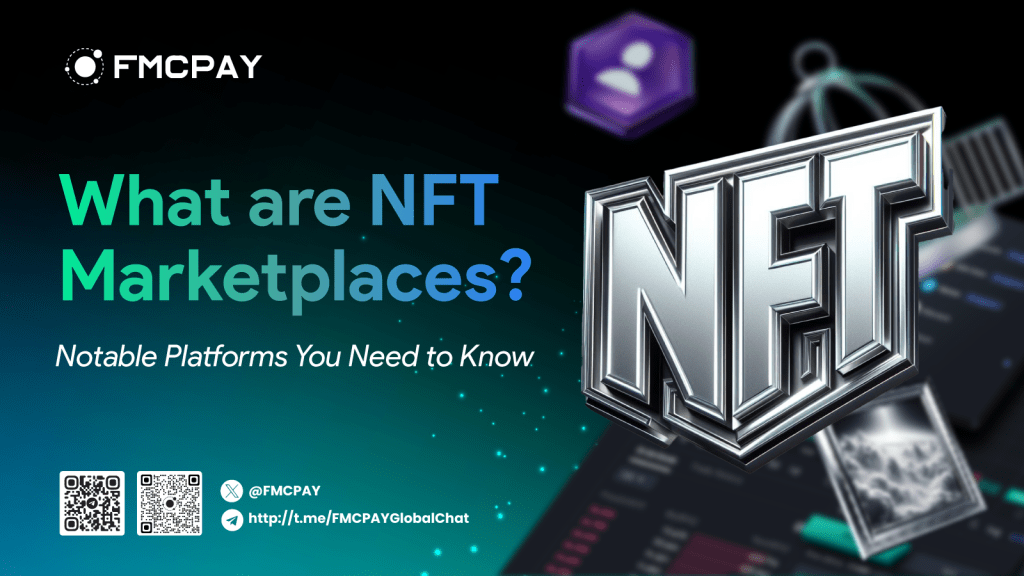NFT is an indispensable part of the crypto market. Numerous NFT markets exist with various directions and levels of influence. What are NFT Marketplaces? Let’s find out the essential NFT marketplaces in this promising field with FMCPAY.
What is NFT?
NFT, or non-fungible token, is a unique token recorded on the blockchain, representing ownership rights to digital or physical assets. The NFT market is where you can buy and sell NFTs.
To grasp the irreplaceable nature of NFT, consider this: you can easily exchange one $5 bill for another due to their fungibility. Currencies can be traded because they are defined by value, not uniqueness.
In contrast, NFTs cannot be exchanged for one another. Each NFT has a distinct and unique identification code, making it different from the rest. This code serves as evidence of authenticity and ownership in the digital realm.
What are NFT marketplaces?
An NFT marketplace operates as a public blockchain platform similar to a trading platform, attracting and promoting developers and businesses to build markets.
NFT marketplaces simplify the storage and trading of NFTs. These tokens are often available for purchase or auction at predetermined prices. To use an NFT marketplace, you need to own an electronic wallet to store and trade your NFT tokens effectively.
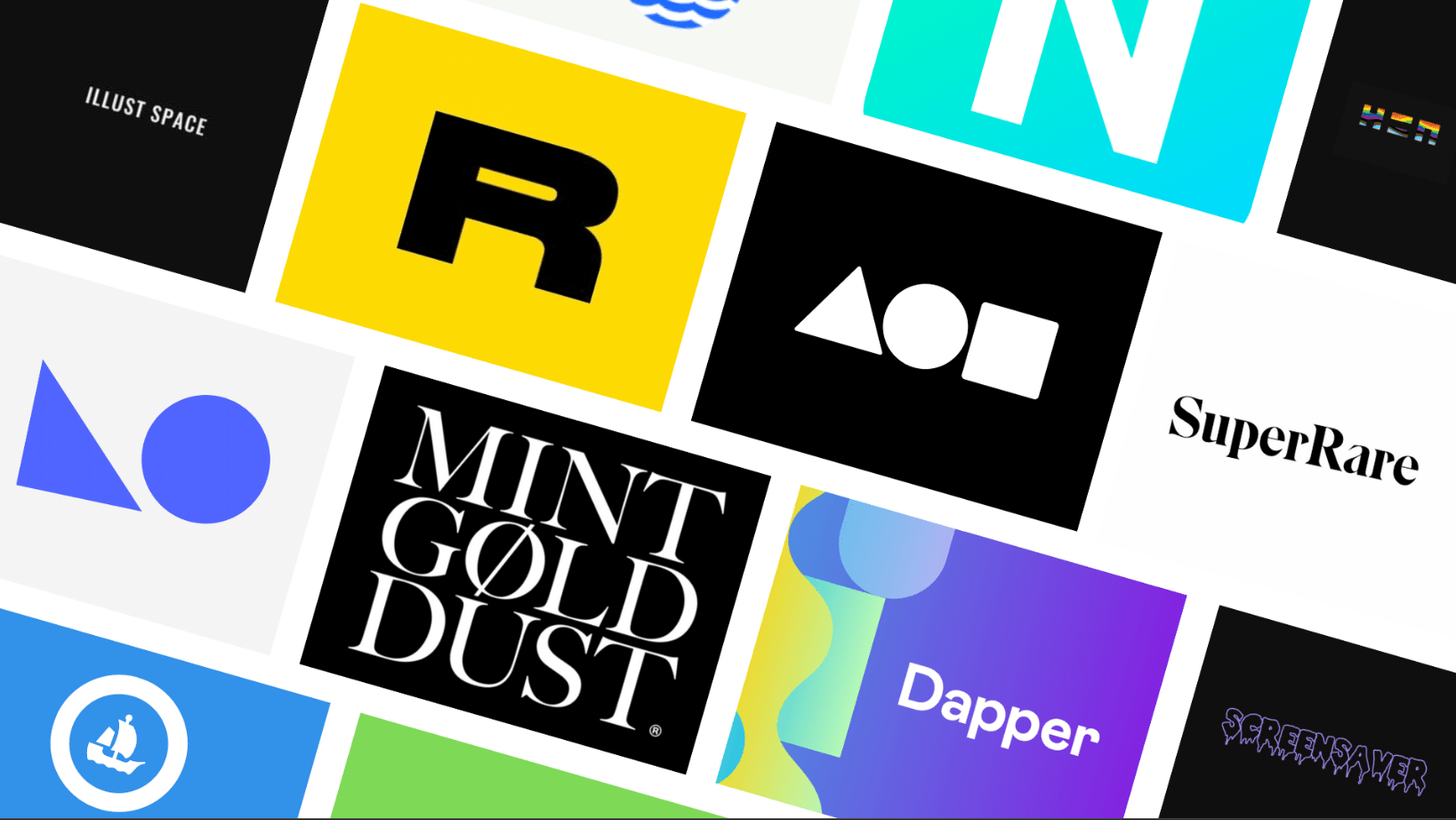
Currently, FMCPAY’s trading platform does not support features specifically tailored for the NFT market. However, in the future, we will consider the possibility of integrating these features into the FMCPAY ecosystem.
Types of NFT marketplaces
Certainly! Here’s a categorization of NFT marketplace platforms based on different criteria:
Niche NFT Marketplaces:
- These platforms focus on specific assets or themes, such as music, art, sports, gaming, or real estate.
- Content is more specialized, and some may offer additional services like recommendations.
Non-Curated NFT Marketplaces:
- Open to everyone who registers to buy or sell NFTs.
- Often referred to as self-service platforms.
- Many mass marketplaces fall under this category.
Curated NFT Marketplaces:
- Known for their quality and reputation.
- Artists are vetted and approved before they can sell their NFTs.
- Frequently feature celebrity art and creations.
Mass NFT Marketplaces:
- Resemble traditional websites like eBay.
- Offer both auction and fixed-price options.
- Cater to a wide variety of NFTs.
- Accept both cryptocurrency and credit card payments.
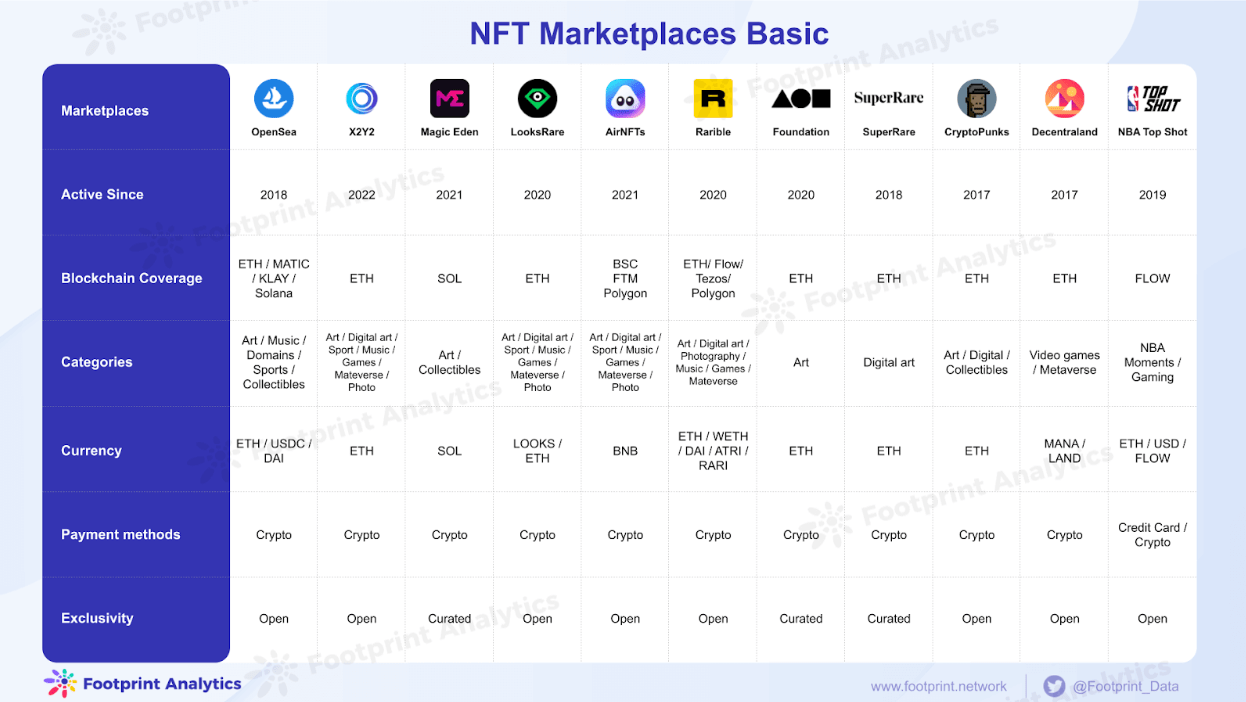
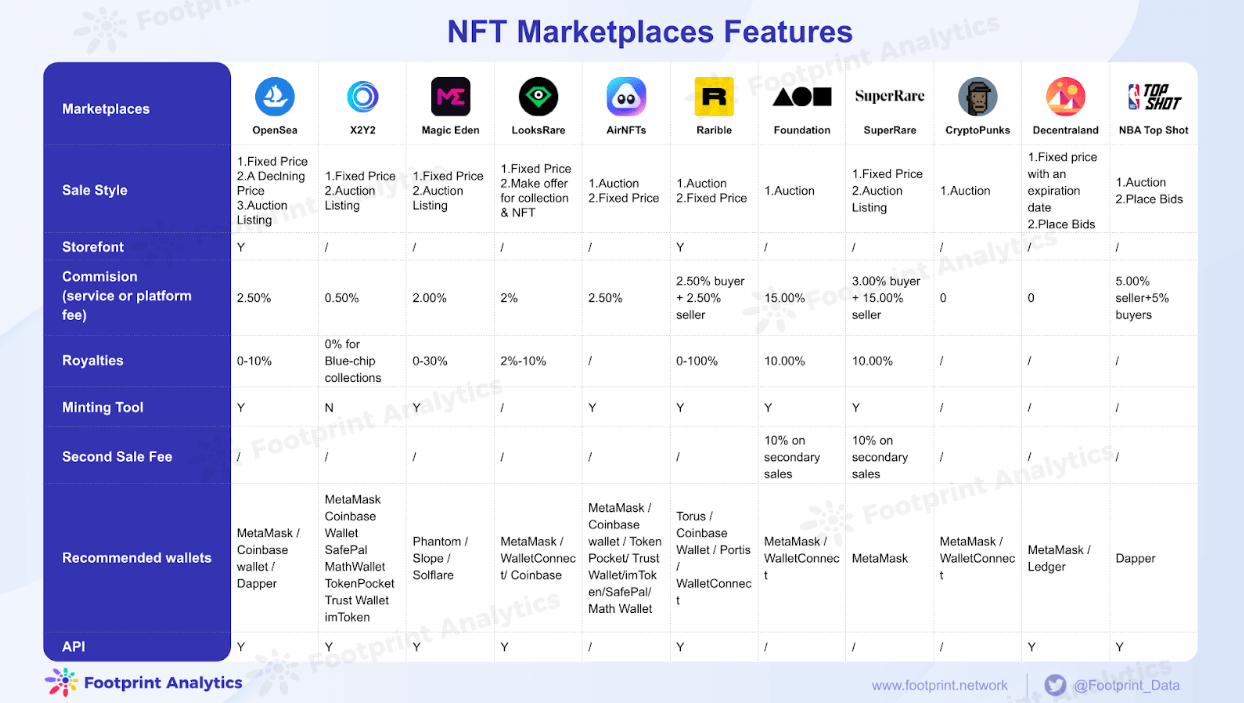
Top NFT marketplaces today
1. OpenSea
OpenSea is currently the largest NFT marketplace. It facilitates the daily trading of various NFTs, including art, censorship-resistant domain names, virtual worlds, trading cards, sports, and collectibles.
Users can buy, sell, and explore exclusive digital assets like Axies, ENS names, CryptoKitties, and Decentraland. OpenSea hosts over 700 different projects, spanning trading card games, collectible games, digital art projects, and domain names.
Creators can mint their own NFTs on the blockchain using OpenSea’s minting tool, enabling the creation of NFT collections without coding knowledge. If you’re developing smart contracts for a project involving NFTs, you can easily list them on OpenSea for public access.
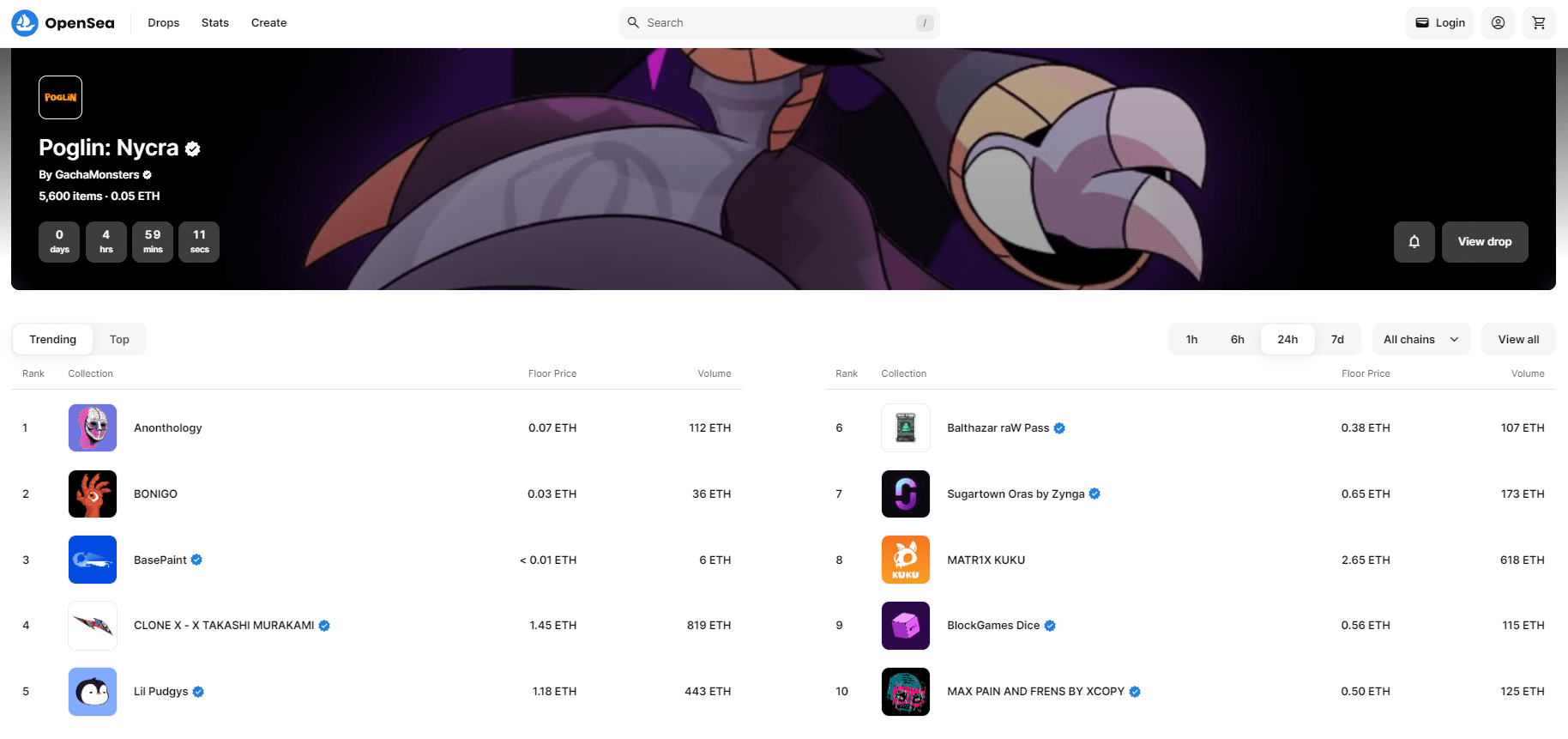
2. Blur
Blur is an NFT Marketplace for Pro Traders that consolidates essential indices related to NFTs, providing a specialized interface for traders. While operating similarly to other NFT marketplaces, Blur stands out with its user-friendly interface and fee-free transactions. However, Blur’s development team encourages users to adjust fees to 0.5%, aligning with other platforms, and provides airdrops for users.
Despite being introduced later than other NFT marketplaces, Blur has quickly gained significant volume, ranking second only to OpenSea.
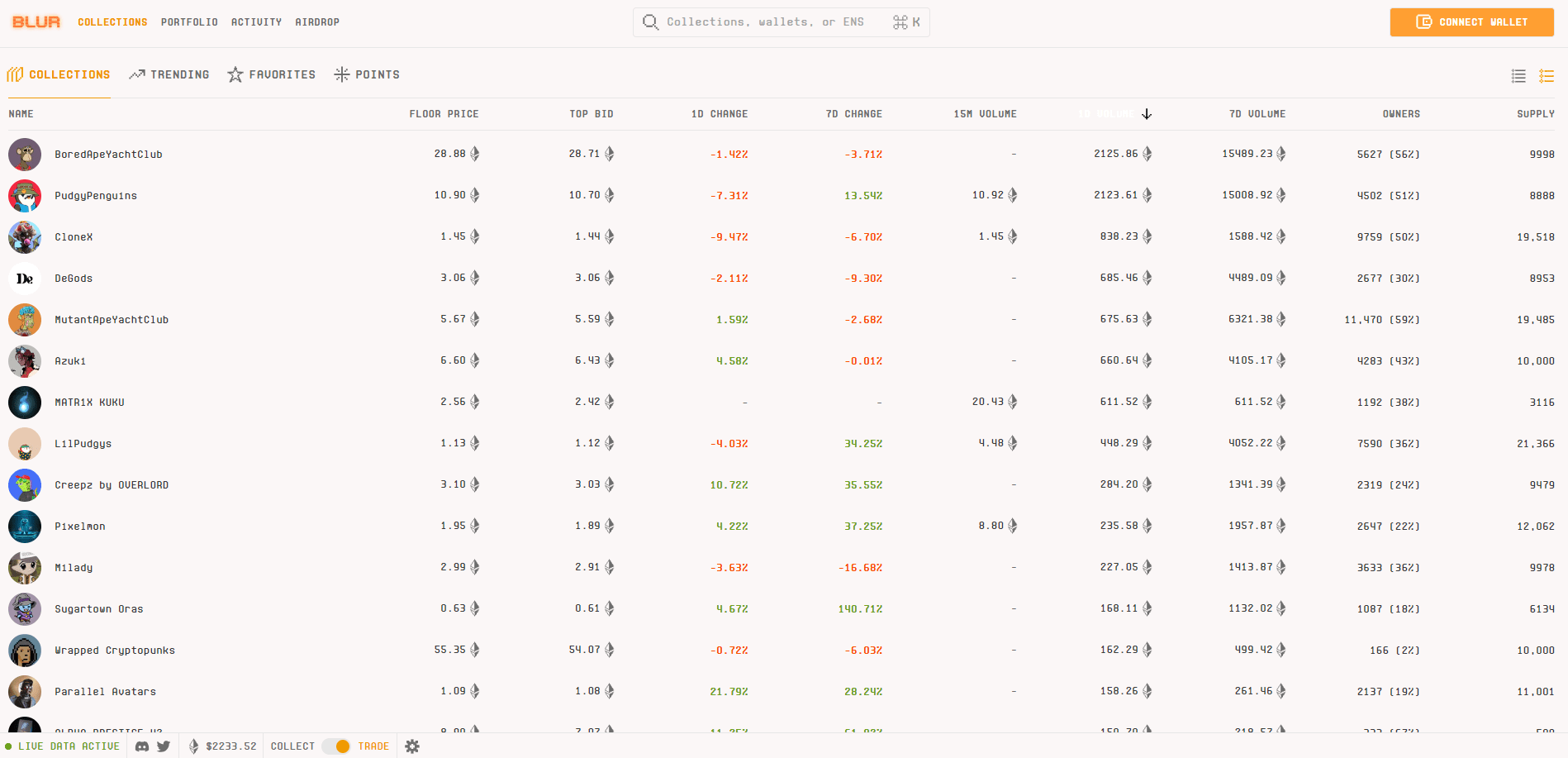
3. Magic Eden
Magic Eden focus on Solana NFT, considered a “web3-first marketplace.” It currently hosts over 7,000 collections, with a transaction volume exceeding $1.6 billion. Beyond serving as an NFT marketplace, Magic Eden supports game creators and introduced Eden Games, a hub for NFT games on Solana. It collaborates with and allows others to create their own marketplaces. Some NFT markets provided by Magic Eden include Thugbird’z Thugstore and Galactic Geckos NFT.
Additionally, Magic Eden has recently expanded to the Bitcoin network with MEonBTC, supporting various blockchains such as ETH, Solana, Polygon, and BTC. Magic Eden also features a Launchpad that allows creators to mint NFTs easily, streamlining the technical steps required to create an NFT.
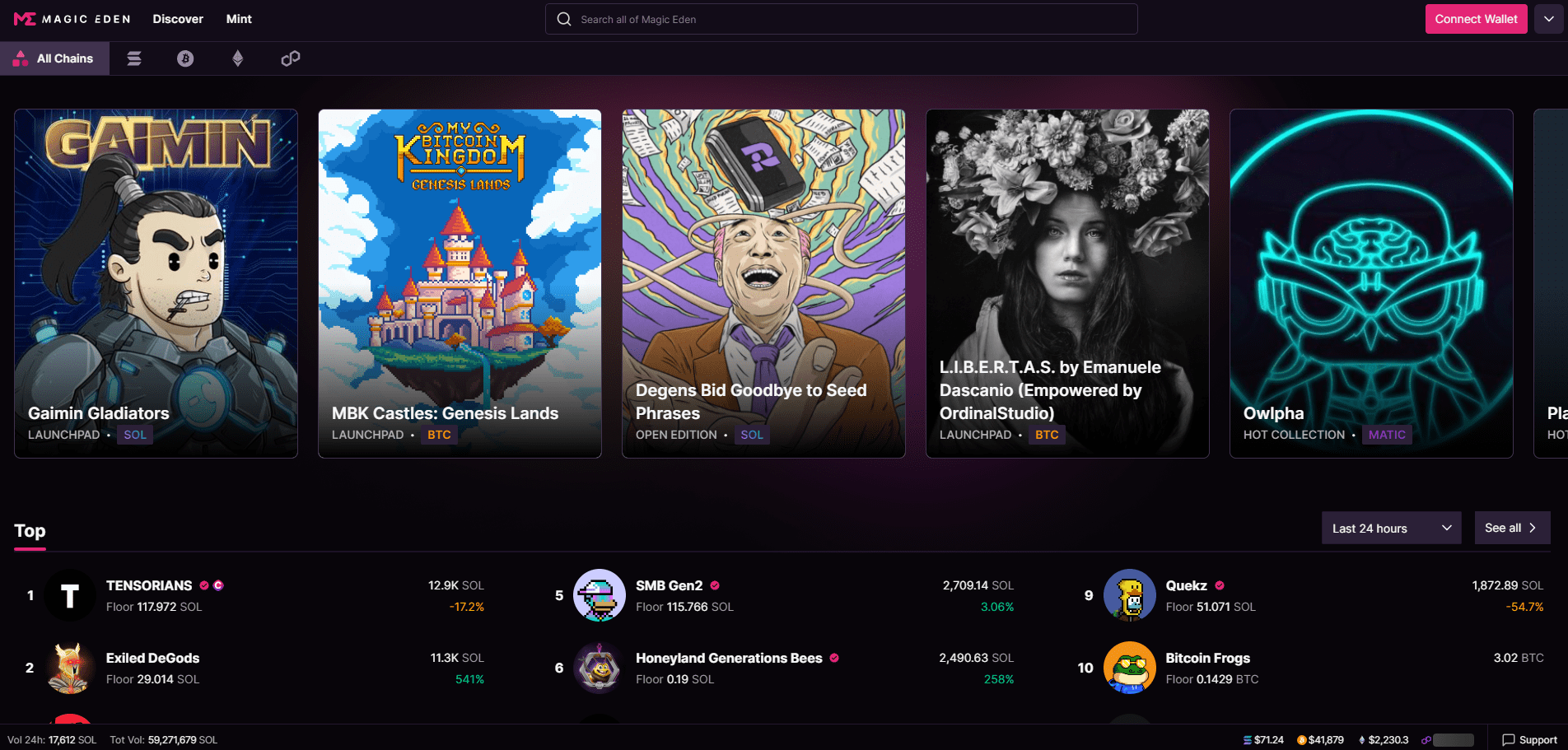
4. Tensor
Tensor is an NFT trading platform on Solana, designed for professional traders in the NFT market. Inspired by Blur, Tensor aims to serve this purpose on Solana, providing an efficient platform for professional NFT traders. Tensor supports features such as exchanges, auctions, storage, conversion, and NFT management, similar to Blur. It is also the first marketplace globally to combine AMM and NFT markets, enabling the auction of collections and instant liquidity for sellers.
What is Tensor? Blur for NFT pro traders but on Solana#NFT is resurging in the crypto market, yet professional trading on Solana faces limitations. What is Tensor? Enter Tensor, a leading platform aiming to enhance Solana NFT trading. FMCPAY will discover why it’s hailed as…
— FMCPAY (@FMCPay) December 12, 2023
Although Tensor entered the NFT Marketplace later, on March 26, 2023, it officially became the largest NFT trading platform on Solana, surpassing both MagicEden and Hadeswap.
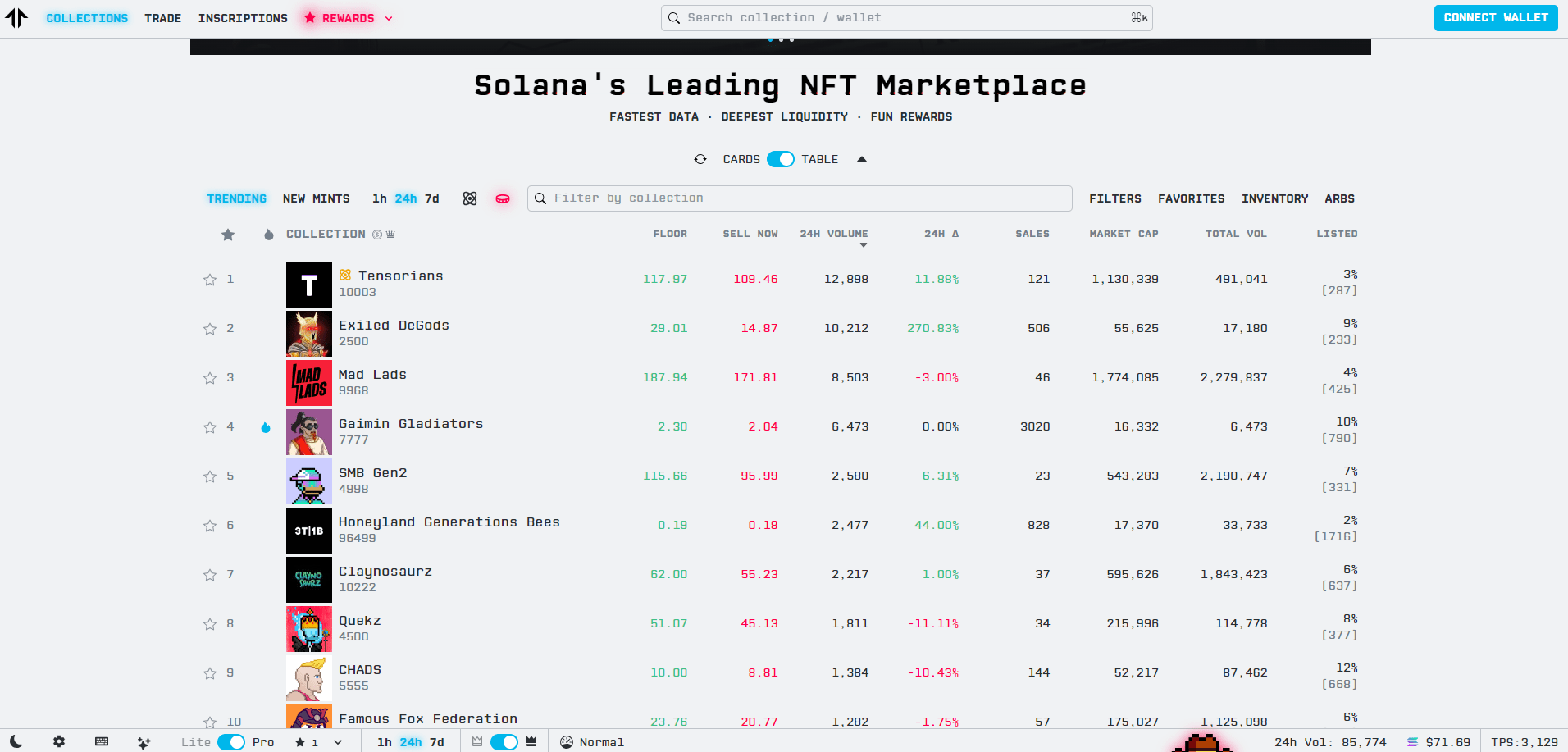
5. Elements
Element Market is an NFT Marketplace aggregator, allowing users to access various exchanges like LooksRare, X2Y2, and more. Unlike OpenSea Pro or Blur, Element Market is currently a multichain marketplace supporting the most blockchain networks, including Ethereum, Polygon, BNB Chain, Avalanche, ZkSync, Starknet, Linea, Base, and Bitcoin.
Element Market is preparing to launch version 3.0 with the aim of improving performance, reducing transaction costs, and integrating new features. Additionally, Element 3.0 will support technical features such as Ordinals and BRC-20 tokens.
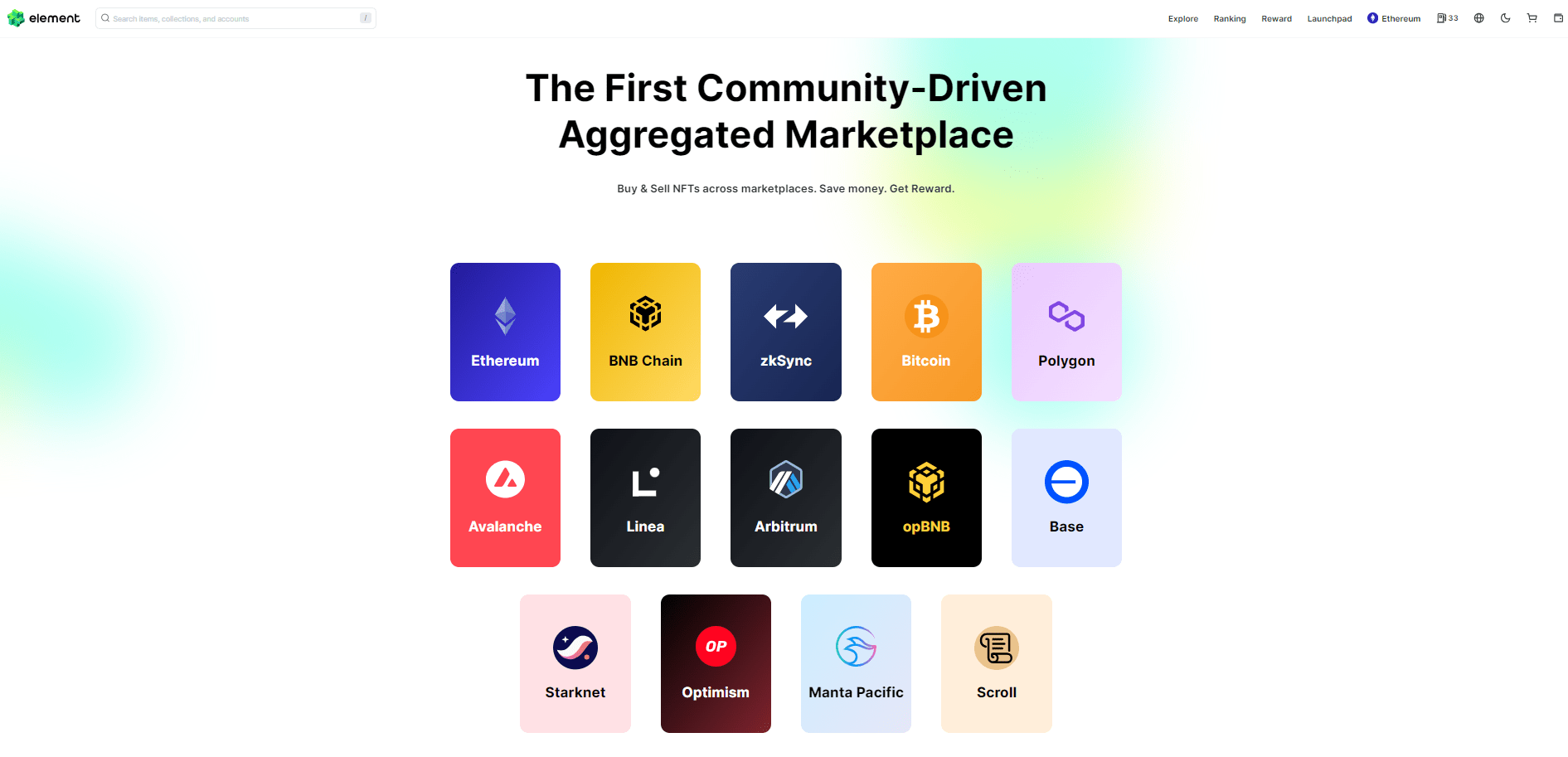
6. Decentraland
Decentraland is a VR world created on Ethereum, making it a secure and reliable NFT marketplace. It allows users to acquire virtual assets and other digital assets like wearables, art, and even names stored in smart contracts on the Ethereum blockchain.
In addition to enabling the purchase of digital assets, Decentraland allows users to create their own assets for listing on the Decentraland marketplace. It features a user-friendly Builder tool for drag-and-drop creation of avatars and 3D scenes.
What sets Decentraland apart from other NFT marketplaces is that its tokens are designed to have value and transferability similar to the real world.
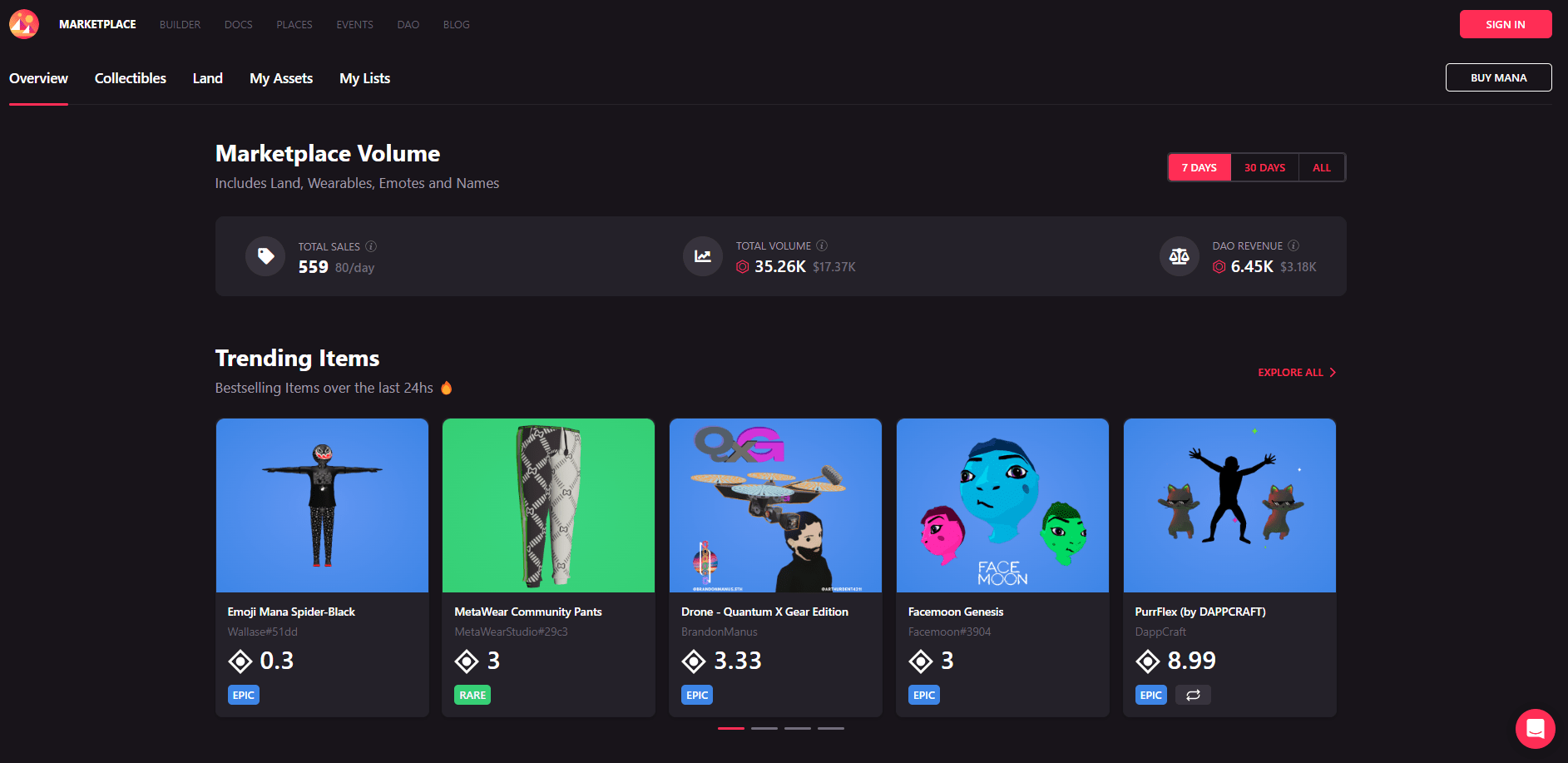
7. Zora
Zora is an NFT marketplace that enables creators, collectors, and artists to buy and sell various types of NFTs, including art, music, and media. Operating as a subscription protocol, Zora allows creators to publish their works, earn money from sales, and enables other users to create and share their own works.
Zora promotes collaboration and implements “Collective Creation,” where its platform and users can work together to create a more transparent, accessible, and ownable infrastructure. Zora focuses on empowering creators to produce an original work that can be publicly accessed by other users and sold an unlimited number of times.
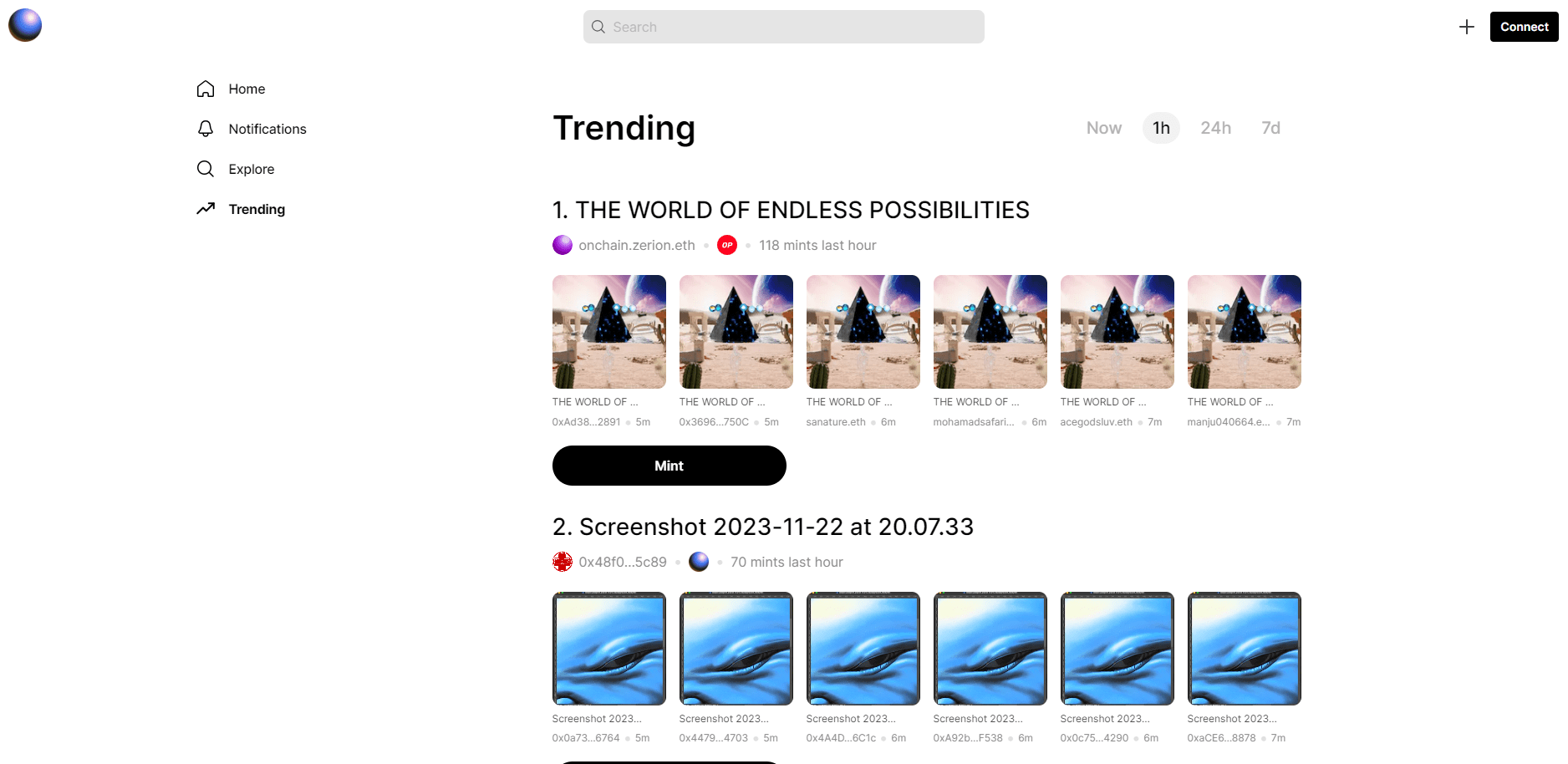
Conclusion
Above are the top NFT trading platforms in the current NFT market. However, with the rapid emergence of new marketplaces and platforms, we may witness significant changes in the future.
Knowledge in the crypto world transforms swiftly, so stay tuned to FMCPAY for continuous updates and learning about new technologies, especially those emerging recently.
Explore other insight articles at: FMCPAY insights
FMCPAY RESEARCH (VINCΞ)

